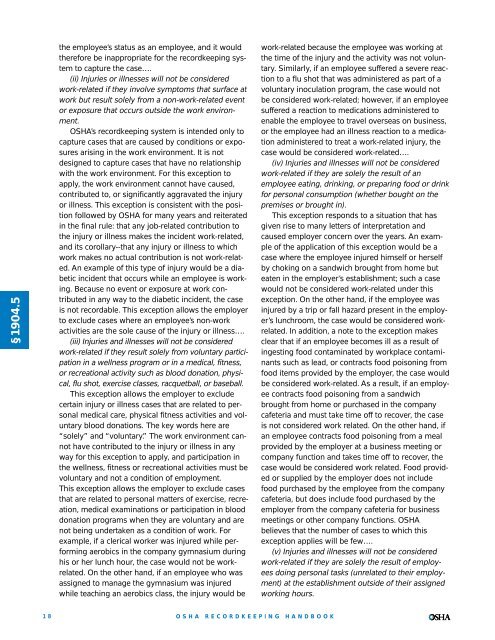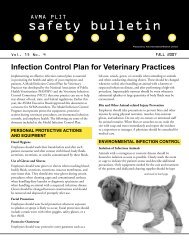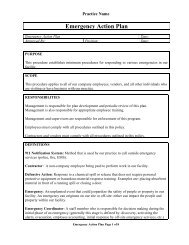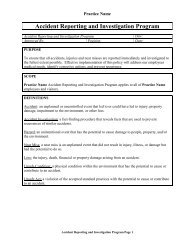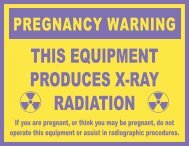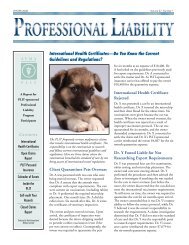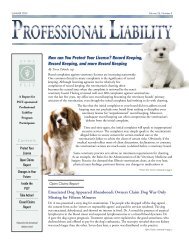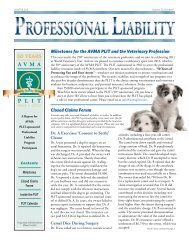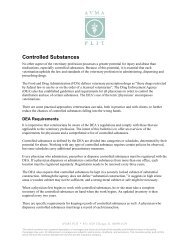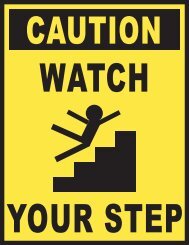§1904.5the employee’s status as an employee, and it wouldtherefore be inappropriate for the recordkeeping systemto capture the case….(ii) Injuries or illnesses will not be consideredwork-related if they involve symptoms that surface atwork but result solely from a non-work-related eventor exposure that occurs outside the work environment.<strong>OSHA</strong>’s recordkeeping system is intended only tocapture cases that are caused by conditions or exposuresarising in the work environment. It is notdesigned to capture cases that have no relationshipwith the work environment. For this exception toapply, the work environment cannot have caused,contributed to, or significantly aggravated the injuryor illness. This exception is consistent with the positionfollowed by <strong>OSHA</strong> for many years and reiteratedin the final rule: that any job-related contribution tothe injury or illness makes the incident work-related,and its corollary--that any injury or illness to whichwork makes no actual contribution is not work-related.An example of this type of injury would be a diabeticincident that occurs while an employee is working.Because no event or exposure at work contributedin any way to the diabetic incident, the caseis not recordable. This exception allows the employerto exclude cases where an employee’s non-workactivities are the sole cause of the injury or illness….(iii) Injuries and illnesses will not be consideredwork-related if they result solely from voluntary participationin a wellness program or in a medical, fitness,or recreational activity such as blood donation, physical,flu shot, exercise classes, racquetball, or baseball.This exception allows the employer to excludecertain injury or illness cases that are related to personalmedical care, physical fitness activities and voluntaryblood donations. The key words here are“solely” and “voluntary.” The work environment cannothave contributed to the injury or illness in anyway for this exception to apply, and participation inthe wellness, fitness or recreational activities must bevoluntary and not a condition of employment.This exception allows the employer to exclude casesthat are related to personal matters of exercise, recreation,medical examinations or participation in blooddonation programs when they are voluntary and arenot being undertaken as a condition of work. Forexample, if a clerical worker was injured while performingaerobics in the company gymnasium duringhis or her lunch hour, the case would not be workrelated.On the other hand, if an employee who wasassigned to manage the gymnasium was injuredwhile teaching an aerobics class, the injury would bework-related because the employee was working atthe time of the injury and the activity was not voluntary.Similarly, if an employee suffered a severe reactionto a flu shot that was administered as part of avoluntary inoculation program, the case would notbe considered work-related; however, if an employeesuffered a reaction to medications administered toenable the employee to travel overseas on business,or the employee had an illness reaction to a medicationadministered to treat a work-related injury, thecase would be considered work-related….(iv) Injuries and illnesses will not be consideredwork-related if they are solely the result of anemployee eating, drinking, or preparing food or drinkfor personal consumption (whether bought on thepremises or brought in).This exception responds to a situation that hasgiven rise to many letters of interpretation andcaused employer concern over the years. An exampleof the application of this exception would be acase where the employee injured himself or herselfby choking on a sandwich brought from home buteaten in the employer’s establishment; such a casewould not be considered work-related under thisexception. On the other hand, if the employee wasinjured by a trip or fall hazard present in the employer’slunchroom, the case would be considered workrelated.In addition, a note to the exception makesclear that if an employee becomes ill as a result ofingesting food contaminated by workplace contaminantssuch as lead, or contracts food poisoning fromfood items provided by the employer, the case wouldbe considered work-related. As a result, if an employeecontracts food poisoning from a sandwichbrought from home or purchased in the companycafeteria and must take time off to recover, the caseis not considered work related. On the other hand, ifan employee contracts food poisoning from a mealprovided by the employer at a business meeting orcompany function and takes time off to recover, thecase would be considered work related. Food providedor supplied by the employer does not includefood purchased by the employee from the companycafeteria, but does include food purchased by theemployer from the company cafeteria for businessmeetings or other company functions. <strong>OSHA</strong>believes that the number of cases to which thisexception applies will be few….(v) Injuries and illnesses will not be consideredwork-related if they are solely the result of employeesdoing personal tasks (unrelated to their employment)at the establishment outside of their assignedworking hours.18<strong>OSHA</strong> RECORDKEEPINGHANDBOOK
This exception, which responds to inquiriesreceived over the years, allows employers limitedflexibility to exclude from the recordkeeping systemsituations where the employee is using the employer’sestablishment for purely personal reasons duringhis or her off-shift time. For example, if an employeewere using a meeting room at the employer’s establishmentoutside of his or her assigned workinghours to hold a meeting for a civic group to which heor she belonged, and slipped and fell in the hallway,the injury would not be considered work-related. Onthe other hand, if the employee were at the employer’sestablishment outside his or her assigned workinghours to attend a company business meeting or acompany training session, such a slip or fall wouldbe work-related. <strong>OSHA</strong> also expects the number ofcases affected by this exception to be small….(vi) Injuries and illnesses will not be consideredwork-related if they are solely the result of personalgrooming, self-medication for a non-work-relatedcondition, or are intentionally self-inflicted.This exception allows the employer to excludefrom the Log cases related to personal hygiene, selfadministeredmedications and intentional self-inflictedinjuries, such as attempted suicide. For example, aburn injury from a hair dryer used at work to dry theemployee’s hair would not be work-related. Similarly,a negative reaction to a medication brought fromhome to treat a non-work condition would not beconsidered a work-related illness, even though it firstmanifested at work. <strong>OSHA</strong> also expects that fewcases will be affected by this exception.(vii) Injuries will not be considered work-related ifthey are caused by motor vehicle accidents occurringin company parking lots or on company access roadswhile employees are commuting to or from work.This exception allows the employer to excludecases where an employee is injured in a motor vehicleaccident while commuting from work to home orfrom home to work or while on a personal errand.For example, if an employee was injured in a caraccident while arriving at work or while leaving thecompany’s property at the end of the day, or whiledriving on his or her lunch hour to run an errand, thecase would not be considered work-related. On theother hand, if an employee was injured in a car accidentwhile leaving the property to purchase suppliesfor the employer, the case would be work-related.This exception represents a change from the positiontaken under the former rule, which was that no injuryor illness occurring in a company parking lot wasconsidered work-related. As explained further below,<strong>OSHA</strong> has concluded, based on the evidence in therecord, that some injuries and illnesses that occur incompany parking lots are clearly caused by workconditions or activities--e.g., being struck by a carwhile painting parking space indicators on the pavementof the lot, slipping on ice permitted to accumulatein the lot by the employer--and by their naturepoint to conditions that could be corrected to improveworkplace safety and health.(viii) Common colds and flu will not be consideredwork-related.Paragraph 1904.5(b)(2)(viii) allows the employer toexclude cases of common cold or flu, even if contractedwhile the employee was at work. However, in thecase of other infectious diseases such as tuberculosis,brucellosis, and hepatitis C, employers must evaluatereports of such illnesses for work relationship, just asthey would any other type of injury or illness.(ix) Mental illness will not be considered workrelatedunless the employee voluntarily provides theemployer with an opinion from a physician or otherlicensed health care professional with appropriatetraining and experience (psychiatrist, psychologist,psychiatric nurse practitioner, etc.) stating that theemployee has a mental illness that is work-related.…<strong>OSHA</strong> agrees that recording work-related mentalillnesses involves several unique issues, includingthe difficulty of detecting, diagnosing and verifyingmental illnesses; and the sensitivity and privacy concernsraised by mental illnesses. Therefore, the finalrule requires employers to record only those mentalillnesses verified by a health care professional withappropriate training and experience in the treatmentof mental illness, such as a psychiatrist, psychologist,or psychiatric nurse practitioner. The employer isunder no obligation to seek out information on mentalillnesses from its employees, and employers arerequired to consider mental illness cases only whenan employee voluntarily presents the employer withan opinion from the health care professional that theemployee has a mental illness and that it is workrelated. In the event that the employer does notbelieve the reported mental illness is work-related,the employer may refer the case to a physician orother licensed health care professional for a secondopinion. <strong>OSHA</strong> also emphasizes that work-relatedmental illnesses, like other illnesses, must be recordedonly when they meet the severity criteria outlinedin Section 1904.7. In addition, for mental illnesses, theemployee’s identity must be protected by omittingthe employee’s name from the <strong>OSHA</strong> 300 Log andinstead entering “privacy concern case” as requiredby Section 1904.29.§1904.5<strong>OSHA</strong> RECORDKEEPINGHANDBOOK19
- Page 1 and 2: www.osha.govOSHARecordkeepingHandbo
- Page 3 and 4: OSHARecordkeeping HandbookThe Regul
- Page 5 and 6: ContentsRecordkeeping HandbookRoadm
- Page 7 and 8: Section 1904.40Providing records to
- Page 10 and 11: §1904.0…OSHA has rejected the su
- Page 12 and 13: §1904.1Since publication of the re
- Page 14 and 15: §1904.2SIC code Industry descripti
- Page 16 and 17: §1904.2tinue to have injury and il
- Page 18 and 19: Section 1904.3Keeping records for m
- Page 20 and 21: PREAMBLE DISCUSSION: Section 1904.4
- Page 22 and 23: (viii)(ix)The illness is the common
- Page 24 and 25: §1904.5employment environment. For
- Page 28 and 29: §1904.5Exceptions Proposed but Not
- Page 30 and 31: §1904.5pain and swelling in a join
- Page 32 and 33: §1904.5the worker has taken a side
- Page 34 and 35: §1904.526“Personal tasks” for
- Page 36 and 37: If the accident had occurred in a l
- Page 38 and 39: Scenario 4:• An employee reports
- Page 40 and 41: In applying [the presumption of wor
- Page 42 and 43: Letters of interpretation related t
- Page 44 and 45: November 19, 2002Joseph Woodward, E
- Page 46 and 47: Letter of interpretation related to
- Page 48 and 49: §1904.6that the two injuries or il
- Page 50 and 51: §1904.6…Under the OSHA recordkee
- Page 52 and 53: FREQUENTLY ASKED QUESTIONS: Section
- Page 54 and 55: Since the employee was not performi
- Page 56 and 57: In each of the eight scenarios in y
- Page 58 and 59: §1904.7other licensed health care
- Page 60 and 61: §1904.7that eliminates the routine
- Page 62 and 63: §1904.7pose. This paragraph also s
- Page 64 and 65: §1904.7Counting Lost Workdays When
- Page 66 and 67: §1904.7tors to such injuries and i
- Page 68 and 69: §1904.7This list of first aid trea
- Page 70 and 71: §1904.7visit to a health care prof
- Page 72 and 73: §1904.7However, as discussed above
- Page 74 and 75: §1904.766immediate recording of si
- Page 76 and 77:
§1904.7strength? How is an employe
- Page 78 and 79:
§1904.7or illness. The severity of
- Page 80 and 81:
The first treatment is glue used to
- Page 82 and 83:
Response: The employer would have t
- Page 84 and 85:
Letter of interpretation related to
- Page 86 and 87:
Letter of interpretation related to
- Page 88 and 89:
§1904.8exposure” as these terms
- Page 90 and 91:
ing blood and other potentially inf
- Page 92 and 93:
standard. In some cases employers v
- Page 94 and 95:
PART 1904—[AMENDED] (67 FR 77170,
- Page 96 and 97:
§1904.1088OSHA RECORDKEEPINGcorrec
- Page 98 and 99:
§1904.1090OSHA RECORDKEEPINGAwaren
- Page 100 and 101:
§1904.1092reasonable checks agains
- Page 102 and 103:
§1904.1094determination. Second, t
- Page 104 and 105:
FREQUENTLY ASKED QUESTIONS: Section
- Page 106 and 107:
Also, from time to time we update o
- Page 108 and 109:
§1904.11Section 1904.11Recording c
- Page 110 and 111:
§1904.11of causation applies to th
- Page 112 and 113:
§1904.12Thus, the total MSD count
- Page 114 and 115:
§1904.12current survey was designe
- Page 116 and 117:
§1904.29son’s blood or other pot
- Page 118 and 119:
§1904.29cern cases, and the list m
- Page 120 and 121:
§1904.29have also been designed to
- Page 122 and 123:
§1904.29with that entry and employ
- Page 124 and 125:
FREQUENTLY ASKED QUESTIONS: Section
- Page 126 and 127:
Section 1904.29(b)(10). In addition
- Page 128 and 129:
Section 1904.30Multiple business es
- Page 130 and 131:
fest themselves quickly and can be
- Page 132 and 133:
§1904.31The term “employee” me
- Page 134 and 135:
§1904.31companies, and other tempo
- Page 136 and 137:
Letter of interpretation related to
- Page 138 and 139:
Scenario 5:• An employee drives i
- Page 140 and 141:
Response: The log is to be kept for
- Page 142 and 143:
Section 1904.32Annual summary(66 FR
- Page 144 and 145:
§1904.32The company executive cert
- Page 146 and 147:
Deletions from the former rule....F
- Page 148 and 149:
I do want to make one further point
- Page 150 and 151:
sede any longer retention periods s
- Page 152 and 153:
Response: The controlling employer
- Page 154 and 155:
Section 1904.35Employee involvement
- Page 156 and 157:
§1904.351904 regulation to provide
- Page 158 and 159:
§1904.35tions on employees’ and
- Page 160 and 161:
employee, the employer must provide
- Page 162 and 163:
Thank you for your interest in occu
- Page 164 and 165:
Letter of interpretation related to
- Page 166 and 167:
Section 1904.36Prohibition against
- Page 168 and 169:
and section 1952.4 spells out the r
- Page 170 and 171:
§1904.38Section 1904.38Variances f
- Page 172 and 173:
§1904.38cited and the citation is
- Page 174 and 175:
§1904.39PREAMBLE DISCUSSION: Secti
- Page 176 and 177:
§1904.39FREQUENTLY ASKED QUESTIONS
- Page 178 and 179:
§1904.40maintains the records at a
- Page 180 and 181:
June 23, 2003Mr. Edwin G. Foulke, J
- Page 182 and 183:
Section 1904.41Annual OSHA injury a
- Page 184 and 185:
Section 1904.42Requests from the Bu
- Page 186 and 187:
Section 1904.43Summary and posting
- Page 188 and 189:
Section 1904.44Retention and updati
- Page 190 and 191:
Section 1904.45OMB control numbers
- Page 192 and 193:
allows him or her to independently
- Page 194 and 195:
§1904.46the three criteria above,
- Page 196 and 197:
§1904.46approach will provide an i
- Page 198 and 199:
FREQUENTLY ASKED QUESTIONS: Section
- Page 200 and 201:
Section 1952.4Injury and illness re


